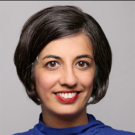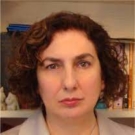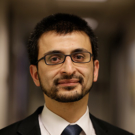Speakers

Hürcan Aslı Aksoy
Deputy Head of the Center for Applied Turkey Studies (CATS)
German Institute for International and Security Affairs (SWP)

Meliha Altunışık
Professor at the Department of International Relations
Middle East Technical University

Nicholas Danforth
Senior Non-Resident Fellow
Hellenic Foundation for European and Foreign Policy (ELIAMEP)

Gönül Tol
Founding Director of the Turkey program and Senior Fellow for the Frontier Europe Initiative
Middle East Institute
About the Webinar
On September 29, Arab Center Washington DC (ACW) hosted a webinar titled “Turkey and the Arab World: Ankara’s Shifting Relations and Evolving Foreign Policy.” Panelists were Hürcan Aslı Aksoy, Deputy Director of the Center for Applied Turkey Studies at the German Institute for International and Security Studies; Meliha Altunışık, Professor of international relations at Middle East Technical University in Ankara; Nicholas Danforth, Senior Non-resident Fellow at the Hellenic Foundation for European and Foreign Policy; and Gönül Tol, Founding Director of the Turkey Program and Senior Fellow for the Frontier Europe Initiative at the Middle East Institute. Mustafa Gurbuz, ACW Non-resident Fellow and Senior Faculty in the Department of Critical Race, Gender, and Culture at American University, moderated the event.
Gönül Tol focused on domestic issues influencing Turkey’s foreign policy, saying that she also does not discount the importance of other factors. She added that Turkish President Recep Tayyip Erdoğan has used ideology as an important tool to remain in power, but that after 2015, he allied himself with Turkey’s nationalists to enhance his domestic strategy.
- On the importance of ideology in Erdogan’s understanding of foreign policy, Tol said, “Erdoğan has been in power for over a decade now and he has used ideology to build his domestic image, his domestic political identity. So, in a way, ideology became a tool for Erdoğan to tell his voters, his domestic constituency who he is and what he stands for.”
- On Erdoğan’s alliance with Turkey’s nationalists, Tol stated, “From 2015 onwards, [Erdoğan] allied himself with the nationalists and once again, he used foreign policy to polish that nationalist image.”
Meliha Altunışık discussed Turkey’s regional moves and renewed relations with other states, defining Turkish normalization with Israel, Egypt, the UAE, and others as less of a radical change in Turkey’s foreign policy and more an “adjustment.” Altunışık said that this adjustment was necessitated by Turkey’s domestic economic troubles, which new relations with the UAE and Saudi Arabia may help address. She also discussed the issue of Syrian refugees in Turkey as a serious concern for Erdoğan and his opponents.
- On the economy, Altunışık said, “Economic problems in Turkey are one of the main drivers of this normalization, because we see emphasis on economic relations with Saudi Arabia, with the UAE; and energy is an important element here because Turkey is an energy-dependent country, and it wants to diversify its energy resources.”
- On Syrian refugees, she stated that when it comes to normalization with regional players, “All the studies show that the number of Syrian refugees is becoming increasingly problematic for the [Turkish] government, especially now that there is an economic crisis, now that the pie has gotten smaller and smaller.”
Hürcan Aslı Aksoy spoke about Turkey’s shifts in foreign policy as part of a larger regional trend, and highlighted the effect of both Russia’s war on Ukraine and of the current stalemate in Libya and Syria on Turkey’s calculus. Aksoy also highlighted Turkey’s relations with Egypt and Tunisia and its position vis a vis Cyprus and Greece in the eastern Mediterranean, as well as its hopes of joining the EU.
- Regarding Turkey’s calculus in the eastern Mediterranean, Aksoy stated, “Turkey has been trying to realign with its Arab neighbors while increasing the escalation with Greece and Cypress…As we see more convergence of interest or more alignment with Arab actors we will probably see more tensions with Greece and Cyprus.”
- On Turkey’s concern with its regional position and its relations with the EU, Aksoy said, “Ankara had to normalize its relations; but at the same time, it seeks to go back to its soft power strategies by staging itself as a mediator between Ukraine and Russia and as an important power in the Black Sea. But Ankara also expects that European states should realize Turkey’s security concerns.”
Nicholas Danforth discussed structural factors limiting Turkey’s rapprochement with the Arab world, and also spoke of different positions held by President Erdoğan and members of the opposition. In addition, Danforth ran through a broad range of Turkey’s international relations, including with Syria and the Assad regime, with Egypt, with Israel and the United States, and with Greece.
- On the role Turkey’s interactions with Greece and Cyprus play in its relations with the Arab world, Danforth said, “Erdoğan’s rapprochement with Arab states goes hand in hand with intensifying hostilities with Greece. Ankara was clearly alarmed by growing ties between Greece and Cyprus and their Middle Eastern neighbors. It saw rapprochement as a way of trying to undermine the development of these relationships.”
- On the limits of Turkey’s rapprochement with the Arab world, Danforth stated, “Erdoğan is nothing if not a pragmatic political actor. And yet there remain very real structural factors that will limit the ability of Turkey to pursue this rapprochement.”

